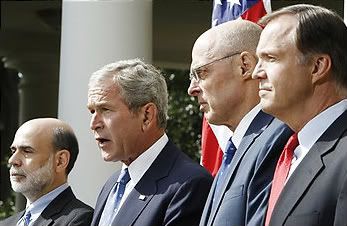-
The Chicago Tribune reports Obama-sponsored mercury-storage bill sent to President Bush. The legislation would ban export of mercury as of 2013.
Stockpiles of toxic mercury kept by industry soon will be stored safely in the United States instead of ending up on the world market where it might pollute the environment.
Under bipartisan legislation Congress sent to President George W. Bush Monday for his expected signature, mercury exports would be banned in 2013 and the Energy Department would be required to store the heavy metal permanently.
The bill’s chief sponsor, Sen. Barack Obama, introduced the bill in response to a 2005 Tribune series about mercury contamination in fish.
-
McClatchy Newspapers report Those who remember the Depression fear its return. “For those who lived it, the Great Depression has been seared into them like a scar or worn like a talisman they can touch any time they want… At the depths of the Depression, over one-quarter of the American workforce was out of work.”
Geneva Spickard is pretty sure America today couldn’t do again what America did to live through its hardest economic times and reign as the financial power it has.
Turner Hinkle agrees. We simply don’t know how.
“I’m afraid if the next depression that hits is like the one in the ’30s, we would not long have a democracy,” says Turner Hinkle. “I don’t think the government can let it be. People are too used to having everything handed to them.”
At 91, she is plagued by arthritis of the spine. She is proud of her two sons, one who became a stockbroker, one who became a doctor.
But a woman who was never afraid during the Depression is afraid now. She is afraid for her great grandchildren and for the world they have been born into.
She calls it “cruel.”
Then adds, “God help them.”
Four at Four continues with young Chinese losing their religion and the Brazilian government facing criminal charges for Amazon deforestation.

 Buried beneath the 100-plus pages of detail that Paulson’s financial rescue plan has picked up during its 10-day journey from a Bush administration wish list to a bipartisan congressional compromise is
Buried beneath the 100-plus pages of detail that Paulson’s financial rescue plan has picked up during its 10-day journey from a Bush administration wish list to a bipartisan congressional compromise is  In 2007, carbon released from burning fossil fuels and producing cement increased 2.9 percent over that released in 2006, to a total of 8.47 gigatons…
In 2007, carbon released from burning fossil fuels and producing cement increased 2.9 percent over that released in 2006, to a total of 8.47 gigatons… 